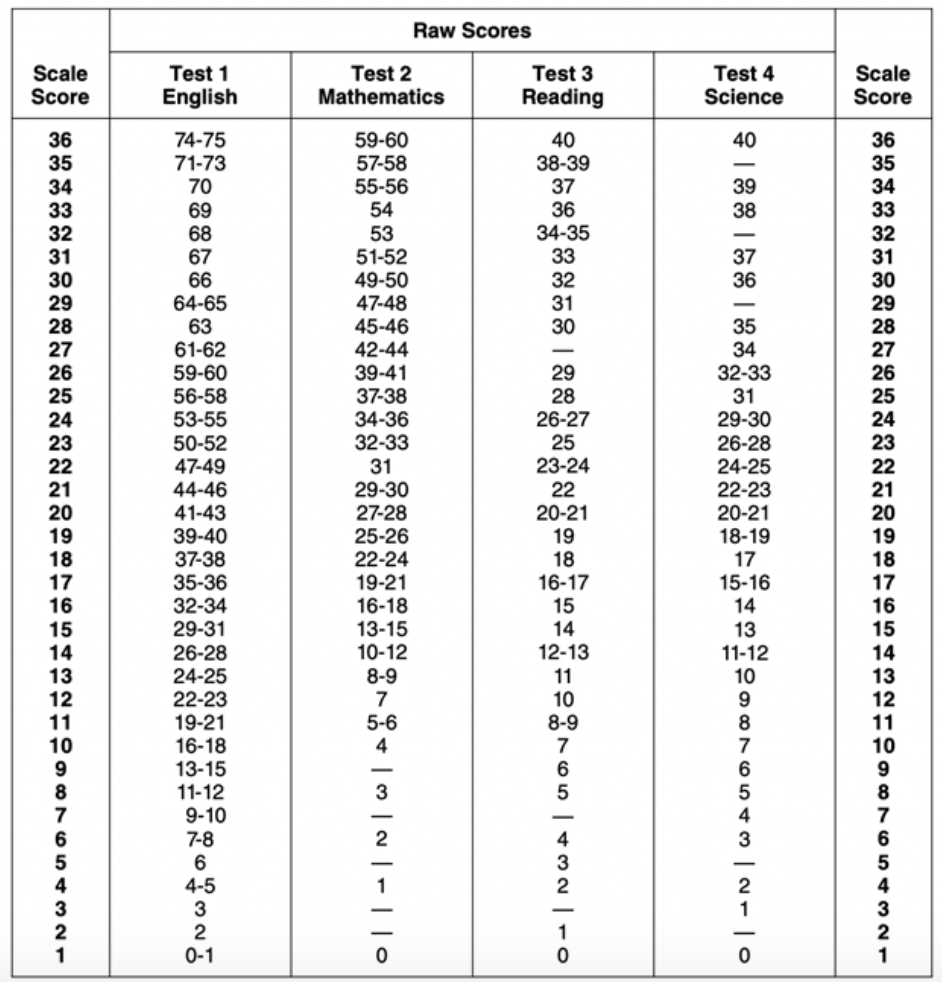How to Get a 36 on the ACT English Test
What’s Covered:
- Overview of the ACT English Test
- How Will the ACT Affect My College Chances?
- How is the ACT English Test Scored?
- How to Get a 36 on the ACT English Test
- Additional resources
Less than 1% of test takers receive a 36 on the ACT—while this statistic may seem daunting, don’t let it derail you from working towards a perfect score! With sufficient practice and test-taking strategies, you’ll be well on your way to getting a 36 on the ACT English test. In this post, we’ll cover the ins and outs of scoring a perfect 36 on this challenging test.
Overview of the ACT English Test
The ACT English Test consists of a series of passages which correspond to multiple-choice questions. These questions test your understanding of effective language use and conventions of standard English.
The test consists of 75 multiple-choice questions, to be answered within 45 minutes. Every question is associated with a passage in some way and falls into one of the following categories:
- Production of Writing (29–32%)
- Knowledge of Language (13–19%)
- Conventions of Standard English (51–56%)
To do well on this test, you’ll need to be aware of the writing style within each passage and utilize your knowledge of conventions of standard English to determine the best answer choice for each question.
How Will the ACT Affect My College Chances?
Your ACT score is utilized, along with other metrics like your GPA, to evaluate your application’s academic strength. This means that scoring high on the ACT will help maximize your chances of acceptance to the universities of your choice.
CollegeVine has made it easy to understand the impact of your score with our Admissions Calculator. This neat tool will take into account your standardized test scores, GPA, course rigor, extracurriculars and more to determine your unique chances at various schools—and best of all, it’s free to use!
How is the ACT English Test Scored?
Like the other sections of the ACT, the number of questions you answer correctly on the ACT English Test constitutes your raw score. Note that you are not penalized for any incorrect answers (so, it’s always beneficial to guess rather than leave a question blank).
Your raw score is then converted to a scaled score. This scale varies from test to test and depends on how other test-takers performed as well. Your scaled score will range from 1 to 36.
Based on past tests, to get a 36 on the ACT English Test, you probably can’t miss more than 0-2 questions. Let’s take a look at a raw score conversion chart from an official ACT practice test for 2021–2022:
For this test, you can miss up to 3 questions on the English section and still receive a perfect score. However, keep in mind that this range was typically lower for past tests, so you should aim for a near-perfect raw score to get a 36 on the ACT English test.
How to Get a 36 on the ACT English Test
Brush up on your grammar skills
It might help to go back to the basics. Refresh your memory by reviewing and testing yourself on basic grammar rules. You’ll need to have a strong foundation of grammar to excel on this test. If you have all the essential grammar rules memorized and handy, it will be easier to apply them on the actual test.
Knowing the grammar rules alone is not enough, however—you’ll also need to be able to determine which answers make the most sense in context. This means that sufficient practice is needed so that you’re able to utilize standard grammar conventions in various contexts.
Read!
A great and simple way to enhance your grammar skills is actually by reading! Seeing standard grammar conventions used in practice will expand your contextual knowledge and make you more comfortable encountering different types of questions.
However, don’t just read any book—try to read texts outside of your usual go-to genres to make yourself more familiar with different writing styles. Also, try to read text similar to what you’ll encounter on the test (like scientific or historical literature).
Take practice tests
Though it’s a cliche, practice really does make perfect. It’s best to practice with official ACT questions to ensure you’re studying relevant material. You can do this by taking practice tests. As you take the tests, pay attention to any common mistakes that you’re making. You should also try to simulate the testing environment as best as possible. This includes timing yourself, putting away your phone, eliminating external distractions, etc. It also might help to take these practice exams with a pencil and paper in order to replicate the testing environment more accurately.
Pay attention to common questions
The ACT often reuses the same grammar rules or style conventions. So, try to notice common trends and make sure that you excel on those types of questions. Once you have a grammar rule down, you should be able to ace every question asking about it. Remember, to achieve a score of 36, you’ll need a near-perfect raw score. Make sure you don’t miss the questions that should be easy points—you really can’t afford to make careless errors.
Additional resources
As you prepare for the ACT English Test, check out some of these other articles:



